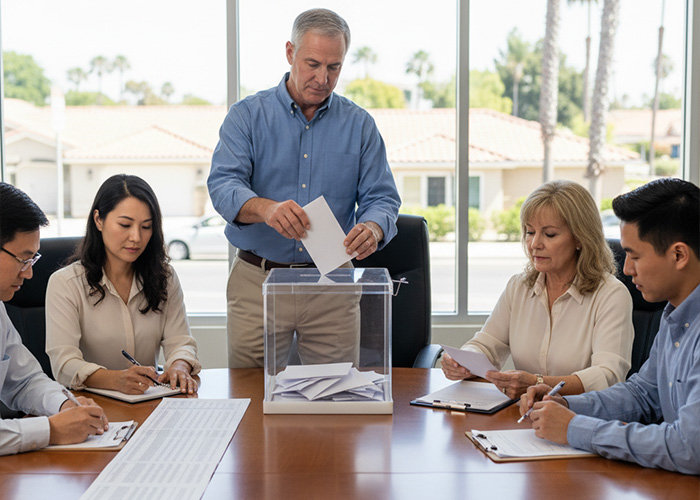Homeowners expect a fair and calm vote. California’s HOA election rules establish the ground rules, ensuring everyone knows what to do and when to do it. This guide explains the key steps in plain language for boards, managers, and members.
The Framework of HOA Election Rules in California
The Davis-Stirling Act sets the framework for member voting across common interest developments. Each association must adopt written HOA election rules that comply with the statute and include local details. These rules cover timelines, nominations, eligibility, balloting, and the certification of results.
The rules are not a formality. They are the playbook for a smooth election. Under the California HOA law on elections, they apply to condos, planned developments, stock co-ops, and large master-planned communities.
Adopting Clear Rules and Keeping Them Current

Boards adopt and amend election rules in open meetings, providing proper notice to members. Good rules do three things: they follow statute, are aligned with the community’s size and needs, and are easy to follow.
Rules should be reviewed each year before the election season. If your association plans to implement electronic voting or modify nomination procedures, allow sufficient time for member notification and board approval. Clear rules reduce disputes and enable inspectors to perform their duties effectively.
Election Timeline and Notices
California requires a simple cadence. Members first receive a general notice that explains how to nominate candidates. That notice must then go out at least 30 days before nominations close.
Next comes a pre-ballot notice at least 30 days before ballots are sent. It lists the meeting date to open and count ballots, the candidate list, and how to return ballots. The ballot package is then sent to members at least 30 days before the voting deadline. If your governing documents require a quorum and you miss it, state law allows a later meeting with a lower quorum under set conditions, as long as new notice is given.
Inspectors of Election

Associations must use one or three independent election inspectors. An inspector can be a qualified volunteer, a notary, a CPA, or a professional firm. Current directors, candidates, and their close relatives are not eligible to serve.
Inspectors receive and secure ballots, verify the voter list, run the count in an open meeting, and certify the results. Treat them as process owners. Provide them with timely access to the member list and any challenges so that they can act promptly and fairly.
Nominations for HOA Elections
Your HOA election rules must explain how owners place their names in nomination and who is eligible to serve. California allows a narrow set of disqualifiers. An association may require that a candidate and a sitting director be current on regular and special assessments. Protections apply when a member has a valid payment plan or has paid under protest.
Other permitted disqualifiers include a recent criminal conviction that would prevent the association from obtaining its fidelity bond, a prohibition on two co-owners serving simultaneously, and a minimum membership period, such as one year. Non-members must be disqualified. Term limits can be enforced if adopted in your governing documents.
The Double-Envelope Method

California uses secret balloting for elections and for other member votes listed in the statute. The written ballot is placed in an inner envelope with no name. That inner envelope is then placed into a signed outer envelope addressed to the inspector.
The outer envelope lets the inspector confirm the voter without exposing the ballot. Members can mail or hand-deliver ballots as directed. Observers may watch the opening and tally at an open meeting. Privacy is protected while the process stays transparent.
Quorum and Reconvened Meetings
Some associations still require a quorum to open and count ballots. If the first meeting fails to reach a quorum, California law permits the association to reconvene later with a reduced quorum, provided certain conditions are met. The association must give fresh notice for the reconvened date and follow the lower-quorum rule exactly as the statute and your documents allow.
The aim is to keep elections moving without throwing out valid ballots. Plan ahead so members know their ballot still matters if the meeting date shifts.
Electronic Voting After 2025

Electronic secret balloting is now allowed if your HOA election rules permit it and if the system meets the law’s safeguards. Authentication, voter privacy, and a verifiable record are required. Paper ballots remain available for members who prefer a written ballot.
Electronic voting can lift turnout and reduce mailing costs. Start early if you plan to add it. Rule changes have their own notice period, and your vendor needs time to set up voter access and testing.
Uncontested Races and Election by Acclamation
When the number of qualified nominees does not exceed the number of open seats, California permits election by acclamation if strict conditions are met. Advance notices, eligibility checks, and timing rules apply. The process saves money and time when a race is uncontested.
Before using acclamation, confirm each step with counsel or your inspector. A missed notice can force a rerun, which defeats the purpose and adds cost.
Campaign Access and Use of Association Media

The HOA election rules must give candidates and members fair access to association media during the campaign season. If the newsletter or website carries one candidate’s statement, it must allow space for others. The association may add a standard disclaimer that candidates are responsible for their own statements.
Candidates and advocates also get reasonable access to common area meeting space at no cost for events tied to the election. Equal access rules apply even when the discussion is spirited. Neutral ground rules help the conversation stay civil.
Preparing the Voter List and Candidate Statements
Accurate records make for a smooth count. Work with management to confirm member names, mailing addresses, and emails for those who opt in to electronic delivery. Update the list when homes change hands or when owners submit new contact details.
Candidate statements should be collected in a uniform format with a firm word limit and a single due date. The association should not edit content for tone or grammar. A neutral disclaimer is the proper tool when views are strong or when claims are disputed.
Running the Count in an Open Meeting

Inspectors open envelopes and tally votes in an open meeting that members may observe. Observers should keep a respectful distance so ballots are not exposed. Once the count is complete, the inspector certifies the results and provides a tally.
Results are announced promptly, then shared with the membership in writing. A clear report builds trust and reduces rumors about how the vote was handled.
Records, Custody, and Member Inspection
After the count, election materials remain in the inspector’s custody for the period set by law. That usually runs one year to match the time allowed for challenges. Materials include returned ballots, signed outer envelopes, voter lists, proxies when used, and the final tally.
Members have the right to inspect election records in accordance with the association’s record-keeping rules. Reasonable inspection and copying procedures apply. Handling these requests with care helps resolve concerns before they escalate.
Common Pitfalls And Simple Fixes

Small missteps can snowball into disputes, delays, and do-overs. Here are some of the most common issues you will likely encounter.
Late or Incomplete Notices
Missed timelines are the fastest way to derail an election. To avoid this, map your dates backward from the count meeting and schedule the general notice, pre-ballot notice, and ballot mailing with clear owners for each step. Additionally, use templates, track delivery methods, and resend corrected notices if you discover an error, so every member has the same information.
Editing Candidate Statements
It is tempting to clean up tone or grammar, but editing candidate content violates equal-access rules. Publish statements as submitted and add a neutral disclaimer that candidates are responsible for their views. Set a uniform word limit, format, and deadline so the process is fair and easy to administer.
Using the Wrong Ballot Package
Written ballots must follow the double-envelope method to protect secrecy. The marked ballot is placed inside an unsigned inner envelope, which is then inserted into a signed outer envelope addressed to the inspector. If you also use electronic voting, require secure authentication and a verifiable audit trail, and include clear return instructions for both methods.
Disqualifying the Wrong Way
Only apply disqualifiers allowed by law and by your adopted rules. Verify assessment status carefully and honor protections for members on valid payment plans or who paid under protest. Document the reason, give prompt written notice, and offer internal dispute resolution so that you can resolve challenges quickly and fairly.
Missing Quorum
A failed first meeting does not mean starting over. When your documents require a quorum and your HOA fails to meet it, use the reconvened meeting option that allows a lower quorum when following statutory steps. Send a fresh notice, make the new date visible across all channels, and remind members that previously returned ballots still count.
Proper Process
California’s HOA election rules create a predictable, private, and fair process for member votes. With a clear calendar, independent inspectors, and steady communication, your community can run smooth elections year after year. Keep your rules current, and keep the focus on member trust.
Need professional help in making sure your HOA elections comply with California rules? Personalized Property Management offers HOA management services around Southern California. Call us at 760-325-9500 or email us at info@ppminternet.com for more information!
Related Articles
